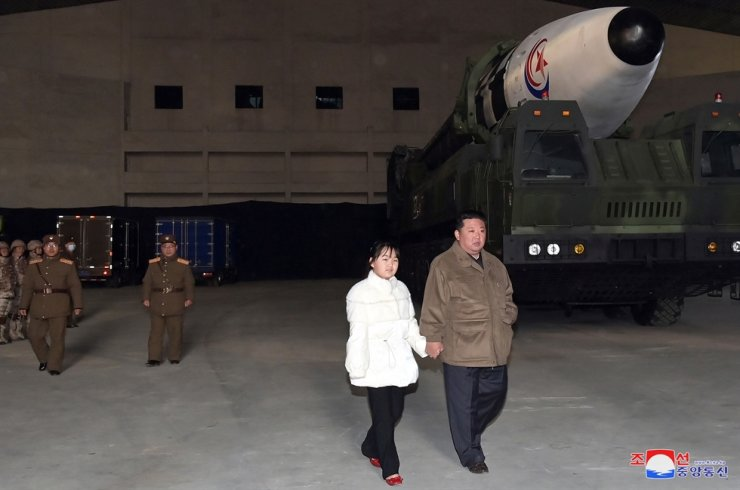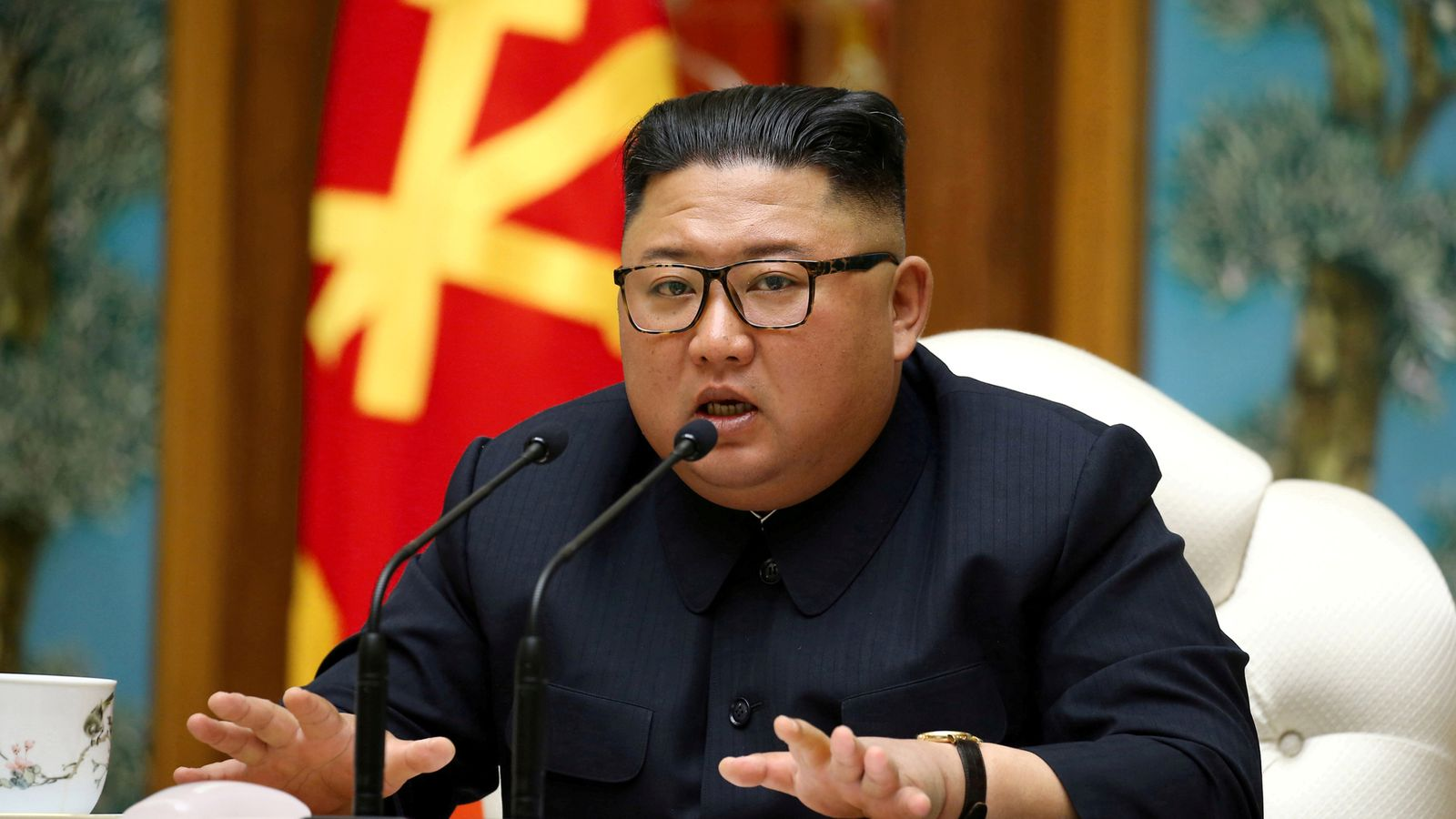In a critical meeting held between December 23 and 27, North Korean leader Kim Jong Un unveiled his country’s most aggressive strategy to counter the perceived security threats posed by the United States and its allies.
The policy-setting gathering of North Korean officials came just days before the New Year, underscoring the high-stakes political environment in Pyongyang.
According to state media, Kim’s strategy was described as the “toughest” yet, aimed at fortifying North Korea’s national security and asserting its stance in the face of growing military alliances between South Korea, the U.S., and Japan.
The meeting also addressed domestic issues, such as the recovery efforts from this year’s devastating floods, and the country’s aspirations to bolster its defense capabilities.
This move by Kim marks a pivotal moment in North Korea’s ongoing efforts to solidify its position in the international arena, particularly regarding its relationship with the U.S. and the West.
As tensions rise, particularly over the growing military cooperation between Washington and Seoul, Kim’s speech and policies illustrate a growing determination to assert North Korea’s power and autonomy on the global stage.
North Korea’s Response to US-South Korea-Japan Military Bloc
A central theme in Kim Jong Un’s address was the increasing alliance between the United States, South Korea, and Japan, which he criticized for expanding into what he termed a “nuclear military bloc.”
Kim’s government has long viewed the growing military cooperation between these countries, especially in the realm of nuclear deterrence and joint military exercises, as a significant threat to North Korean sovereignty and security.
Read : North Korean Soldier Fighting for Russia Captured in Ukraine Dies
In response, Kim reiterated the necessity for North Korea to pursue what he called the “toughest” measures to safeguard its interests and counteract the strategic alliance.
Read : North Korea Sends Poop-Filled Balloons to South Korea: A New Low in Escalating Tensions
Kim’s rhetoric focused on the perceived threat posed by the U.S.-led bloc, which he described as positioning South Korea as an “anti-communist outpost” for the West. This language is consistent with North Korea’s long-standing stance that its security is undermined by the influence of Western powers in the region.

For Pyongyang, the presence of U.S. military forces in South Korea and Japan, combined with regular joint military drills, exacerbates its security concerns. Kim’s announcement signals a commitment to ramp up North Korea’s military capabilities, particularly in terms of its nuclear and missile programs, as a counterbalance to this growing military cooperation.
The specific details of North Korea’s response remain vague, but Kim’s mention of the “toughest strategy” implies a further hardening of policies, including enhanced military readiness and the possible development of new weapons systems.
This stance is likely to exacerbate the already tense relationship between North Korea and the U.S., especially with Washington viewing Pyongyang’s weapons development as a destabilizing force in the region.
Strengthening Domestic Policies and International Alliances
While the main focus of the meeting centered on defense strategy, Kim Jong Un also used the gathering to address internal matters. One key issue discussed was the country’s response to the devastating floods that hit North Korea earlier this year.
The government outlined its plan to relocate people affected by the floods to Pyongyang, the capital, as part of its disaster management efforts. This is part of North Korea’s broader push to present itself as a resilient nation that can handle both internal and external challenges.

Another significant outcome of the meeting was the reshuffling of key leadership positions in the North Korean government. Pak Thae Song was appointed as the new premier, replacing Kim Tok Hun, in what seems to be part of Kim Jong Un’s strategy to streamline governance in light of the growing pressures the country faces.
Foreign Minister Choe Son Hui was promoted to a member of the powerful Politburo of the Workers’ Party of Korea, signaling her increasing influence in the administration’s foreign policy.
These internal developments are significant because they reflect Kim Jong Un’s efforts to consolidate power at home while simultaneously positioning North Korea to strengthen its external alliances.
Kim’s government has long sought to promote stronger ties with “friendly” nations, and the recent meeting highlighted the country’s intention to advance relationships with other nations that share its anti-Western stance.

One notable partnership that was discussed is the growing relationship between North Korea and Russia, exemplified by the summit between Kim Jong Un and Russian President Vladimir Putin earlier this year. The two leaders signed a deal that included a mutual defense pledge, much to the concern of Washington and Seoul.
Tensions with the US and Allies Over North Korea-Russia Military Cooperation
The deepening ties between North Korea and Russia have been a significant source of concern for the United States and its allies. Following the summit between Kim and Putin, there have been increasing reports of North Korean military support for Russia’s war in Ukraine.
This has led to heightened tensions between the U.S. and North Korea, with Washington condemning any form of military cooperation between Pyongyang and Moscow. The U.S. has expressed its concerns over the possible dispatch of North Korean troops to fight for Russia in Ukraine, viewing it as a violation of international sanctions imposed on North Korea.
This cooperation between North Korea and Russia is seen as part of a broader geopolitical realignment in the region, with North Korea positioning itself as a counterbalance to the West.
While much of the focus has been on Russia’s involvement in Ukraine, the deeper implications of North Korea’s relationship with Moscow are likely to shape the dynamics of the East Asian security environment for years to come.

The growing military cooperation between Russia and North Korea could prompt the U.S. and its allies to recalibrate their strategies in dealing with both Moscow and Pyongyang. Kim Jong Un’s latest policy announcement reinforces North Korea’s resolve to resist external pressures and to pursue its goals, regardless of international condemnation.
His call for a “toughest” strategy against the U.S. reflects the belief in Pyongyang that only through a robust defense capability, including nuclear deterrence, can North Korea ensure its survival in an increasingly hostile geopolitical environment.
Kim Jong Un’s unveiling of North Korea’s toughest strategy to counter the U.S. threat marks a significant escalation in the country’s approach to national security. As Pyongyang continues to develop its nuclear and missile programs, the tension between North Korea and the U.S. is set to intensify.
With the growing military cooperation between the U.S., South Korea, and Japan, Kim’s policies are aimed at maintaining a balance of power in the region. The reshuffling of leadership positions and the focus on strengthening relations with “friendly” countries also indicate a clear strategic direction for North Korea in 2024.
As international tensions continue to rise, the global community must pay close attention to the developments in the Korean Peninsula, as North Korea’s approach could have far-reaching consequences for regional stability and security.

